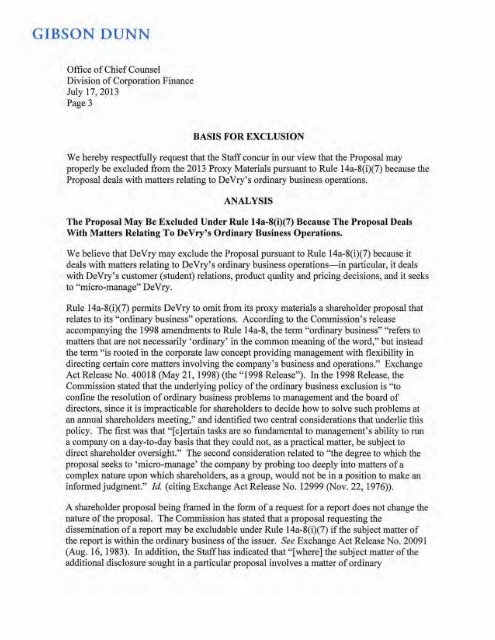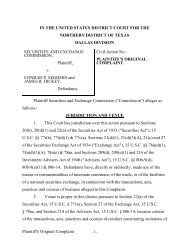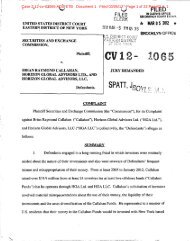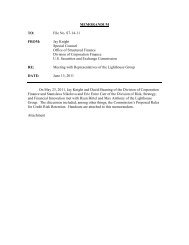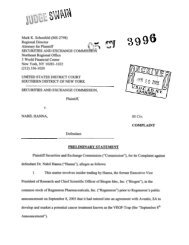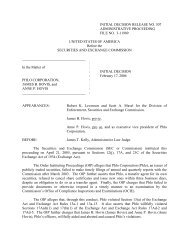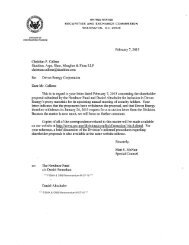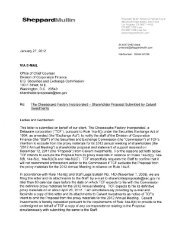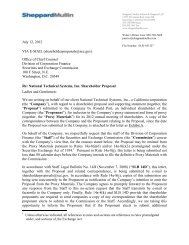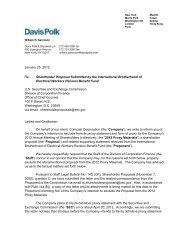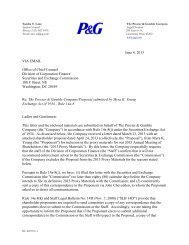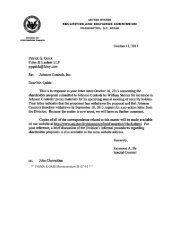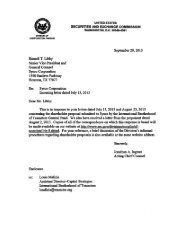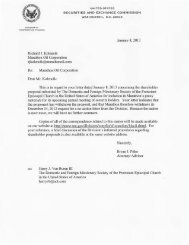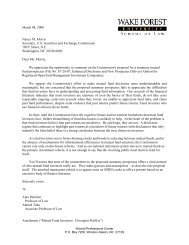GIBSON DUNN
De Vry Inc.; Rule 14a8 no-action letter - Securities and Exchange ...
De Vry Inc.; Rule 14a8 no-action letter - Securities and Exchange ...
- No tags were found...
Create successful ePaper yourself
Turn your PDF publications into a flip-book with our unique Google optimized e-Paper software.
<strong>GIBSON</strong> <strong>DUNN</strong> <br />
Office of Chief Counsel<br />
Division of Corporation Finance<br />
July 17, 2013<br />
Page 3<br />
BASIS FOR EXCLUSION<br />
We hereby respectfully request that the Staff concur in our view that the Proposal may<br />
properly be excluded from the 2013 Proxy Materials pursuant to Rule 14a-8(i)(7) because the<br />
Proposal deals with matters relating to DeVry's ordinary business operations.<br />
ANALYSIS<br />
The Proposal May Be Excluded Under Rule 14a-8(i)(7) Because The Proposal Deals<br />
With Matters Relating To DeVry's Ordinary Business Operations.<br />
We believe that DeVry may exclude the Proposal pursuant to Rule 14a-8(i)(7) because it<br />
deals with matters relating to DeVry's ordinary business operations-in particular, it deals<br />
with DeVry's customer (student) relations, product quality and pricing decisions, and it seeks<br />
to "micro-manage" DeVry.<br />
Rule 14a-8(i)(7) permits DeVry to omit from its proxy materials a shareholder proposal that<br />
relates to its "ordinary business" operations. According to the Commission's release<br />
accompanying the 1998 amendments to Rule 14a-8, the term "ordinary business" "refers to<br />
matters that are not necessarily 'ordinary' in the common meaning of the word," but instead<br />
the term "is rooted in the corporate law concept providing management with flexibility in<br />
directing certain core matters involving the company's business and operations." Exchange<br />
Act Release No. 40018 (May 21, 1998) (the "1998 Release"). In the 1998 Release, the<br />
Commission stated that the underlying policy of the ordinary business exclusion is "to<br />
confine the resolution of ordinary business problems to management and the board of<br />
directors, since it is impracticable for shareholders to decide how to solve such problems at<br />
an annual shareholders meeting," and identified two central considerations that underlie this<br />
policy. The first was that "[c]ertain tasks are so fundamental to management's ability to run<br />
a company on a day-to-day basis that they could not, as a practical matter, be subject to<br />
direct shareholder oversight." The second consideration related to "the degree to which the<br />
proposal seeks to 'micro-manage' the company by probing too deeply into matters of a<br />
complex nature upon which shareholders, as a group, would not be in a position to make an<br />
informed judgment." !d. (citing Exchange Act Release No. 12999 (Nov. 22, 1976)).<br />
A shareholder proposal being framed in the form ofa request for a report does not change the<br />
nature of the proposal. The Commission has stated that a proposal requesting the<br />
dissemination ofa report may be excludable under Rule 14a-8(i)(7) if the subject matter of<br />
the report is within the ordinary business of the issuer. See Exchange Act Release No. 20091<br />
(Aug. 16, 1983). In addition, the Staffhas indicated that "[where] the subject matter ofthe<br />
additional disclosure sought in a particular proposal involves a matter ofordinary


